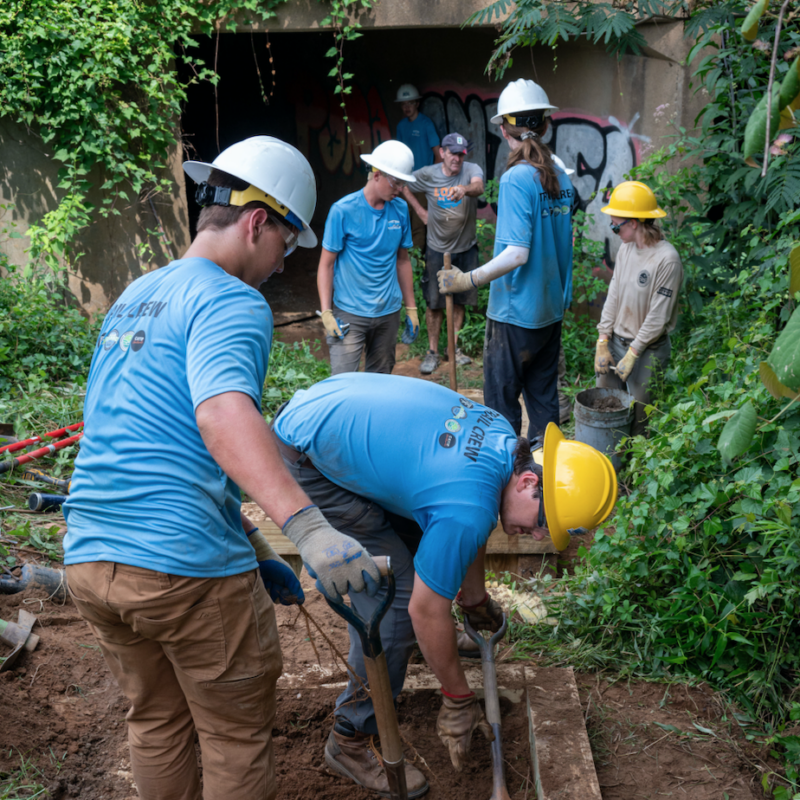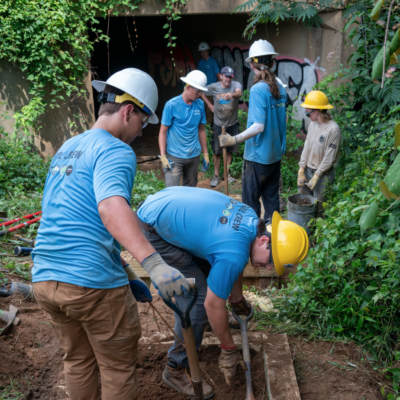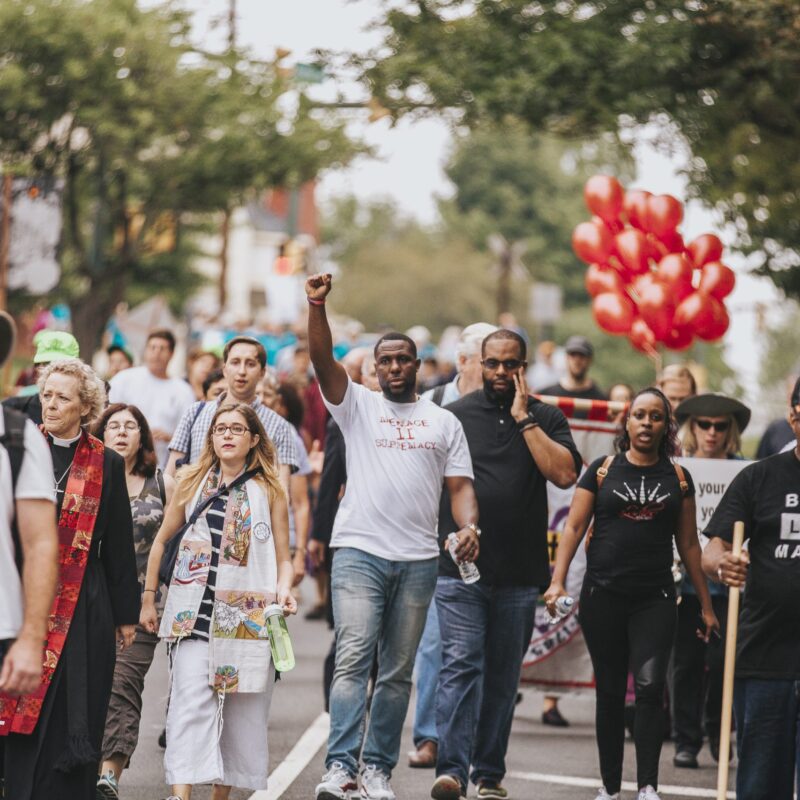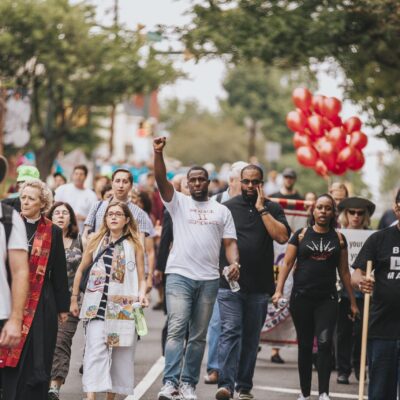There’s a divide in our community. It’s not about race, class, or education, though it can intersect with all three of those in ways that are both clichéd and surprising. On one side of the divide are those who look at the world from behind their steering wheels. They see the city and the county as a web of roads, to be navigated with the windows rolled up to keep out the heat and the noise and the breeze. They travel inside their own personal spaces, along with folded-up blankets and month-old Twix wrappers and concert tickets from 2008 jammed into their glove boxes. When they want curry, they get in the car. When they need a new fridge, they get in the car. When their kids have ballgames, they get in the car. On the other side are the people who look at the world as a field of obstacles, possibilities, weather scenarios and transportation services. They navigate by bus map, bike lane, back-alley shortcut and, occasionally, with phone calls to their sister or a taxi company. They may call their condition “car-free,” something to celebrate, or they may feel trapped by age, disability, or economics. Whether carlessness is a choice or just a condition, these people are part of a 10 percent minority in America, and they share the need to approach the transportation problem as a puzzle. Do they ride the #7? Call a cab when it’s snowy? Brave the crosswalks? I spoke to eight people who solve that puzzle daily. They’re from different walks of life; one has a son who’s 11, and one just turned 92. In their own words, here’s how they get around.
|
|
Donna Carty and Steven Smoller are 60 and 56, respectively, and have lived in Charlottesville about a year and a half. Before that, they’d spent five years in Norwich, England, and long lived car-free in New York City and Europe—Donna since 1986, Steven for the last 14 years. He had two hip replacements within the last year and is retired; she works a number of part-time jobs.
Steven: “I was born and raised in L.A., and started driving at 16. In L.A., I drove 50 miles every day to see all my friends. I was a very good driver. Now I realize I don’t have to have a car. Life doesn’t stop. CAT has a sign up that says it costs $8,000 a year to own a car. People keep driving and don’t make the connection with global warming, what the cost is to the environment of all these people driving.”
Donna: “[Public transport in the U.K.] is complete—you can get anywhere. Seniors can ride the buses free throughout the country.”
Steven: “[In Charlottesville] you can have unlimited travel for $20 a month. If you happen to be handicapped, as I am, you can ride the buses anywhere. JAUNT is $1.50 to go anywhere you need to go. I use it frequently. I go to Barracks Road, Kroger, CVS, On Our Own…I go to different meetings and events throughout the city, I see friends, we go to Walmart, Kmart…”
Donna: “If we wanted to go to one of the outlying parks, or the Habitat Store, or Circa, we’d have trouble getting there. I have been known to take a bus to Preston, walk down to Habitat, and take a taxi back with whatever I bought. I couldn’t do it on 100-degree days.”
Steven: “When I go to Kroger I go on JAUNT and take a taxi back. It’s $10. You can’t take 10 bags on CAT or JAUNT.”
Donna: “But you can still take a lot of $10 taxi rides for $8,000.
“Because we don’t have a car I can afford to do topsy-turvy work. I have a part-time job, I tutor math and science with PVCC and as a freelancer and with Huntington Learning Center. I take CAT there and it takes me an hour and a half each way.”
Steven: “I go to medical appointments; I see one to three doctors per month. The bus service in critical parts of Charlottesville works very well. But it doesn’t go far from the critical parts. They need more buses. To go to Fontaine Research Park, it required me to take a bus to the transit center, then to the West Complex of the hospital, then a shuttle to my appointment. The round-trip was six vehicles and one and a half hours each way. If you missed the bus by five minutes and it’s the wrong time of day, you’d have to wait 45 minutes.”
Donna: “It’s really nice they have buses into the night. It’s a pity it doesn’t run [a complete schedule] on Sunday because many people would probably like to use the bus to get to church. Being a pedestrian rather than a driver, I’ve turned invisible. The newer stores make you walk a mile to go in if you arrive on the bus. I guess I would expect better from Whole Foods.
“[On the bus] I read, and I’m a fan of keeping my mind active. I do Killer Sudoku.”
Steven: “I tend to do my meditation on the bus, which I practice every day. I occasionally listen to music through my earbuds…But some days it feels like a long, long ride. It takes a lot of patience.”
Donna: “It was never a question that we would try to live without a car. Our budget would have to go up quite a bit.”
Steven: “It’s strange at first. But if you’re open minded and think about what you’re saving instead of what you’re losing…People tie in freedom and autonomy with having a car. You have to learn patience, and deal with some weather, but it’s worth it.”
/sveOff-0786.jpg) |
Misty Boos works for JABA and has lived in Charlottesville five years.
“I haven’t owned a car since I lived in Hawaii eight or nine years ago. I went to study in Australia and that’s where I learned everybody can ride the bus. I’d get on the bus with doctors and lawyers. Coming back here, I was like, ‘Everybody rides the bus!’ You rapidly find out everybody doesn’t.
“Someone’s always driving. I’d rather pay in to gas or buy them dinner than own my own car. I think my friends agree. It makes me interact with my friends more. When I owned one I would jet off to the mountains by myself. [When I moved here] I joined hiking groups, social groups. It’s increased my quality of life [not to own one].
“I’ve tried a few times to own cars. When I turned 16, I got a job at McDonald’s, and got my car. It kept breaking down. At the end of the day, that whole job was to support a car I was only driving to work. It was an eye-opener. “I went up to Oregon to get an environmental planning degree and learned what cars are doing to our cities. I tried several times to own cars and it never worked out well. The times I didn’t own a car I felt more free. The downside is, you have to be more organized. You can’t just jet to the store when you forget something. I like my life that way—more organized.
“If I go on a big trip, I rent a car. It’s still infinitely cheaper.
“I live on JPA and work [on E. Market Street]. I take the free trolley Downtown, rattly stinky thing that is, but it’s free and I love it. [From there] I either walk, which is a lovely way to wake up, or take the bus. [For groceries], I rely heavily on Relay Foods. That is such a great thing.
“29N is just a hostile environment. I’m young and very fit and it’s still scary. I can’t imagine being a senior [and navigating that area]. I ride the 7 out there a lot. But I dread it.
“I biked a lot when I first moved here and got terrified. Now I do short runs around UVA. I won’t bike Downtown unless it’s late at night And that’s too bad.
“Unless it was a car share, [I won’t own a car in the future]. Working for a nonprofit, I have to be selective how I spend my money, and I’d rather spend it on international trips and friends. I’d like to put my energy toward making Charlottesville a more bike- and pedestrian- and bus-friendly town. Working with the elderly, it’s not just a nice thing to have, it’s essential. There’s nothing worse than getting isolated when you’re older.”
/sveOff-0657.jpg) |
Maggie Smith, 82, lives on Ridge Street and frequently uses JAUNT, particularly to get to JABA’s Mary Williams Community Center on East Market Street.
“Things have changed with JAUNT. People used to have a hard time getting them to come back. This girlfriend of mine went Downtown to the bank, and they were supposed to pick her up, and she stayed down there at least two hours waiting for them to pick her up. At that time JAUNT wasn’t all that good.
“JAUNT now is great. I live on Ridge Street. They pick me up there.
“I used to have a car. I’ve been without a car for five or six years. I can’t afford the payments. When I first gave up my car I wasn’t using JAUNT; I just lately started. I used the bus and my husband had a car. We’re not together. He got the car and I’m stranded.
“I go with Mary Williams Community Center on shopping tours. Anyplace they go, I go. My daughter has a car. If I need to go to the store, my second cousin takes me. If I had a car, I wouldn’t need to ask for rides.
“JAUNT got some nice people driving. J.J.—he’s great. He’s so good with the people. He’ll help us up on the bus, help us down, we talk, we have fun right on the bus. That’s fun. We enjoy each other.
“I ride JAUNT four days a week. There’s quite a few places I would like to go and don’t have a car. If I had a car, I’d go shopping. Even at grocery stores, if I need anything I wouldn’t have to ask people and wait on people. [After grocery shopping,] if I’m on the bus with J.J. he’ll take the groceries down for me.
“I won’t have a car again, not unless somebody gives me one. I wish. As my mother says, nothing better than having something your own.”
/sveOff-0848.jpg) |
Shelly Stern is a single parent of 11-year-old Emerson. They’ve lived in Charlottesville for almost 10 years. Stern owned a car for a time but has largely gotten herself and her son around by bike, occasionally bartering for use of friends’ cars and more recently buying a share in the same truck that Blue and Arbabi use. She’s a Belmont resident and a member of the advisory board at Community Bikes.
“When I first moved here I did not have [a car]. I had my son in cloth diapers and I would put the big bag of diapers in the stroller to go to the laundromat. I was really wishing the sidewalk was clear—it was during a snowy period. It’s definitely a different way of looking at the town.
“I bought an old Subaru for a dollar and a chocolate bar. I ended up selling the Subaru to buy a plane ticket to Belize in 2008.
“It was less a conscious [decision] when I moved into Charlottesville—I just didn’t have any money. It was primarily economic.
“At one point I was housesitting for someone and saw this book Divorce Your Car. I remember peeking through that before I was consciously choosing to live car-free. A friend said something about a single parent in Florida who didn’t have a car. I remember being inspired by that. I just made the decision and went with it.
“We’ve become familiar with the city bus schedule. My son rode a city bus to his summer camp this morning. And now we’re part of the truck share. If I need to pick up mulch or compost, or do a dump run, that’s available.
“For several years we biked to Jackson-Via Elementary from our home in Belmont. It was three miles each way. We rode a tandem bike and then [my son] graduated to his own bike. When it’s 30 degrees, that becomes a harder sell. If it’s really hot he’d be happy to take a ride. He bikes less since he learned the bus. He’s in this tween category; he feels independent with his bus pass.
“I feel equipped to navigate the city streets. It’s about an expectation that we can share the road. That’s what I’ve passed on to my son—we have shared rights and responsibilities with other vehicles. Be predictable.
“The benefits—we shop at a lot of local shops. C’ville Market is on the bike ride home. It makes us aware of our consumption when we’re physically carrying our stuff home. When he was biking six miles a day, that was good for his physical health, both of our mental and emotional health. It was good for him to have that mobility before he started the day.
“There are probably times when I’m impatient and I want a vehicle. But I could call up a neighbor and say I’m sick and my son needs to get somewhere…I have this resource and you have this resource. I have peaches on my tree now, I’ll bake you a pie.
“Every year we take our bikes on a big trip. We rode the C&O bike trail—rode 160 miles and camped. We were reading this book about a young woman who rode the canal boat during the Civil War. We were so much a part of the environment, feeling good that we were transporting ourselves. There were no cars; we saw a blue heron on the water, we picked paw paws. If we took a vacation in our car, we might have missed those things. It just feels more integrated.”
|
|
Kassia Arbabi and Sky Blue, who moved to Charlottesville two and a half years ago, share a home and help run several businesses together, in-cluding Alexander House hostel and C’ville Foodscapes. They met while living at the Louisa County commune Twin Oaks, where members share vehicles; Blue has never personally owned a car and Arbabi owned one for just eight months. Now they’re members of a vehicle share. About a year ago, they paid $350 for one of six shares in a 1987 Toyota pickup truck, which is now available to them for occasional errands. Otherwise they’re dedicated cyclists.
Sky: “We use [the truck] once or twice a week. We try to stack a bunch of errands, especially if we have to go up 29N.”
Kassia: “It’s super bare bones. There’s no radio, no dashboard. There’s no heat—in the winter we have blankets.”
Sky: “If you push it you can get it up to 75.”
Kassia: “C’ville Foodscapes is one of the owners.”
Sky: “It’s been cool having individual owners and this business, all sharing use of this vehicle.”
Kassia: “I don’t think [living totally car-free] is impossible. It requires a good amount of creativity. For me, it’s environmental and also sort of social/cultural in terms of getting your needs met, getting in a car versus getting on the bus or biking or walking, which causes you to interact with your environment and community.
Living at Twin Oaks, it was clear that there’s a lot to be gained from the creative problem–solving that it takes. When I drive somewhere I arrive grouchy from the traffic. When I bike I arrive energized, relaxed, refreshed. Even when we are using the truck, at the end of the day I’m like ‘Get it away, I miss biking!’”
Sky: “The environmental impact is a huge motivator. I grew up in California and my parents were avid environmentalists. I’ve always had a certain awareness of the geopolitical realities instilled in me. I was 10 when the first war in Iraq happened—it was pretty obvious that that was about oil.”
Kassia: “We intentionally live below the poverty line. We live simply, but there’s a richness to our lives. We eat really healthy food, we travel when we want to. It’s not getting caught in the loop—working a job you hate, needing the car to get to the job, needing the job to pay for the car…it’s stepping out of that.
“Most of what we need is in a five-mile radius.”
Sky: “We can get pretty much anywhere in a 15-20 minute bike ride.”
Kassia: “We have a couple panniers—we can fit a ton of groceries, potluck dishes, plants, whatever we need. And bike trailers are wonderful.
“I’ve developed my line of summer biking clothes that dry fast. I try to wear as little as possible. In winter, I have big heavy mittens.
“The cars in Charlottesville are pretty aware, but I do a lot of making eye contact—‘Hey, I’m here.’ It’s actually easier and quicker to ride, especially downtown, I’ll beat [drivers] by the time they park. For Foodscapes we try to use bikes, then we use the truck share for wood or clients who are out [of town]. We did buy bikes for the business.
“I definitely bike around with my fiddle.”
Sky: “I have a compact drum set. I’ve used the bike trailer with the drums when we busked on the Mall.”
Kassia: “The most sad [sacrifice] is getting to nice hiking spots. I’ve ridden to Ragged Mountain. There’s the parks. But if we want to get to the Shenandoah, there’s no public transit.”
Sky: “[Another challenge is] furniture moving, which you can do with the right bike trailer, but…”
Kassia: “No, [I’ll never own a car.] My utopian vision would be that there’s no need for personal vehicles. No one would have the desire because it wouldn’t be necessary.”
Sky: “We’re both committed to shared community living, where there will always be options for shared community use [of vehicles].”
/sveOff-0681.jpg) |
Pearl Braxton turned 92 this year and has lived without a car in Charlottesville her entire life. These days she uses JAUNT to get around.
“I’ve been riding with J.J. 20 years. To us elderly ladies he has a lot of respect for us, and we love him dearly. He’s an all-around great guy.
“I’ve never owned a car. I used to ride the city bus.
“We go on trips; J.J. always drives us. We just came back from grocery shopping. When we go home he’ll take them to the door for me. We go different places—Richmond, Harrisonburg, Waynesboro, Fredericksburg, Williamsburg. We go on trips three or four times a year. They’ve cut our trips down since gas prices went up. We go to the peach orchards. When it’s apple picking time we go to Carter’s Mountain.
“I never thought about owning a car. I was born on Third Street where McDonald’s is now. I was born and raised in Charlottesville.”
/sveOff-0961.jpg)
/sveOff-1132.jpg)
/sveOff-1084.jpg)





